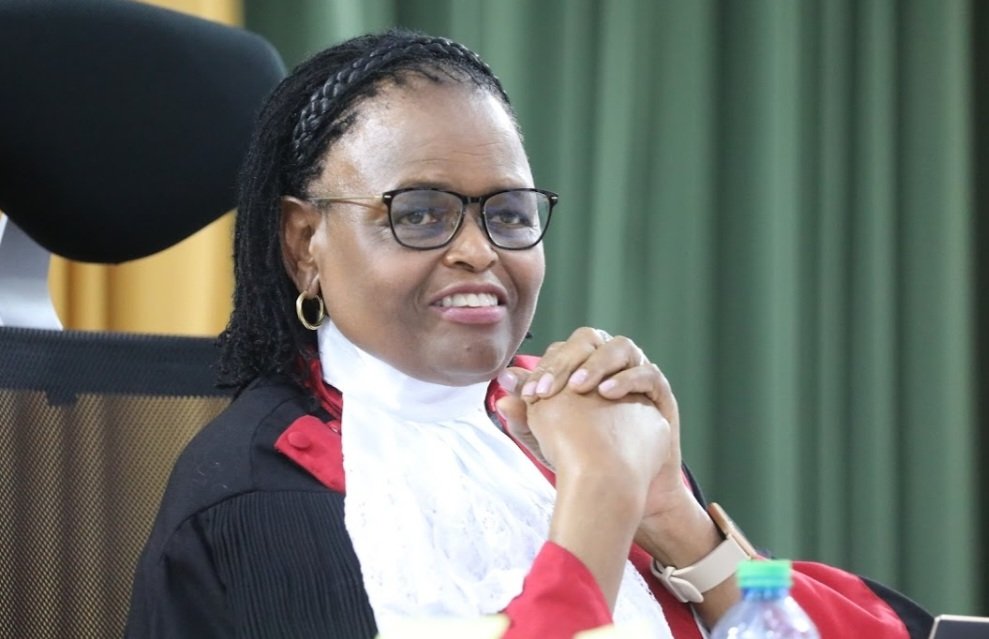Chief Justice Martha Koome has urged judges of the Employment and Labour Relations Court (ELRC) to interpret and apply labour laws in a manner that is sensitive to both economic realities and the enduring constitutional imperative to protect the dignity and rights of workers.
In her speech, delivered virtually at the official opening of this year’s edition of the ERLC Judges Conference, CJ Koome emphasised that as a specialised court, the ELRC plays a central role in safeguarding the labour rights of workers, even amidst economic downturns.
“The ERLC must balance competing rights and interests; the right of workers to fair remuneration and protection against unfair termination on the one hand, and the right of employers to reorganise for survival and economic viability on the other,” said CJ Koome
She observed that the theme of this year’s conference, ‘Insolvency, Labour Rights, and Technology at the Employment and Labour Relations Court’, captured the dynamic and interrelated forces that are shaping the world of work and, consequently, the nature of disputes that come before the ELRC. The conference is being held in Nakuru.
She highlighted the evolving nature of labour rights in the context of a digital and technology-driven economy, noting that the impact of technological advancements on the workplace cannot be overstated.
“We are seeing a shift towards digital platforms, automation, artificial intelligence, and gig work, which all raise important legal and ethical considerations for both workers and employers,” observed CJ Koome.
She encouraged the judges to explore ways to leverage technology to improve the administration of justice, saying that technology provides tools that can enhance efficiency, transparency, and accessibility in courtrooms.
“We have already made significant progress with online filing and virtual hearings, which have allowed us to continue delivering justice, even in the face of challenges such as the COVID-19 pandemic.”
The Chief Justice said the Judiciary is rolling out transcription support to all courts nationwide adding that judges must however continue to innovate and explore ways to further integrate technology into their work, not only to streamline processes but also to enhance access to justice for all, especially the vulnerable and those in marginalised and remote areas.
The Cabinet Secretary for the Ministry of Labour and Social Protection, Dr. Alfred Mutua, who was the chief guest at the conference, praised the Employment and Labour Court for its fair approach. He highlighted that the court handles cases promptly, giving Wananchi a strong sense of justice and fairness.
Speaking at the conference, the Director-General of the Kenya Judiciary Academy, Justice Dr. Smokin Wanjala, acknowledged the crucial role of the ELRC in shaping and supporting the economy. He highlighted its contribution to ensuring stability, upholding the rule of law, promoting fair labour practices, and fostering justice in the labour market and lauded the court’s efforts in promoting industrial harmony, regulating employment practices, and influencing policy and legal reforms.
“As Judges, we must bear in mind that the Judiciary is an independent custodian of justice with the mandate of deciding disputes brought before the courts impartially,” said Justice Wanjala.
He added: “Courts are expected to resolve disputes in a just manner, in line with the Constitution and all other laws, and thereby facilitate the attainment of the rule of law. Certainty of court processes, objectivity and impartiality are fundamental. This will ensure that members of the public have confidence and trust in the Judiciary as a neutral arbiter in disputes.”
The Chief Registrar of the Judiciary Winfridah Mokaya noted that the digital revolution continues to transform the workplace, reshaping labour relations and creating new legal complexities. She reaffirmed the Judiciary’s commitment to responsive justice.
“Through ongoing reforms—including court digitization, registry automation, and capacity building—we are equipping our institution to handle these emerging intersections of insolvency, labour rights, and technology.”









